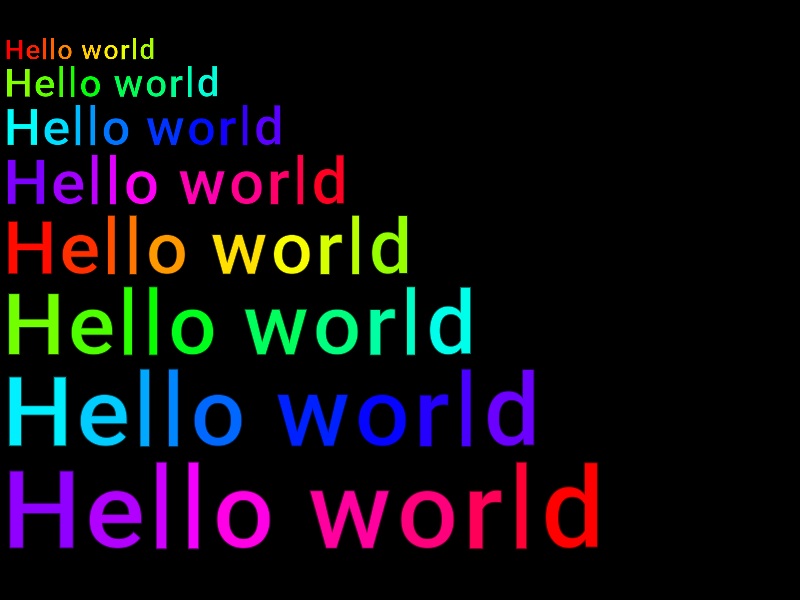Glyph Visual¶
The Glyph visual provides low-level, high-performance text rendering using individual positioned glyphs. It supports fine control over placement, scaling, color, and layout — ideal for custom labeling, annotations, or scientific overlays where flexibility matters.
This visual operates at the glyph level and can render multiple strings using groups of glyphs.
This visual is currently implemented with multichannel signed distance fields.

Overview¶
- Renders glyphs as positioned 2D quads in 3D NDC space
- Supports per-glyph: color, size, position, shift, rotation, scaling
- Strings are created by grouping glyphs with the same position
- Anchoring is relative to the entire string, not each glyph
- Highly flexible, low-level control — not a high-level text API
- Uses a builtin texture font atlas — font and atlas customization will be implemented and documented later
When to use¶
Use the glyph visual when:
- You want fine-grained control over text rendering (e.g. per-character styling)
- You need rotated, scaled, or colored strings at arbitrary 3D positions
- You’re rendering structured labels, not paragraphs
Properties¶
Per-item¶
| Attribute | Type | Description |
|---|---|---|
position |
(N, 3) float32 |
Anchor position for each glyph (in NDC) |
axis |
(N, 3) float32 |
Not implemented yet |
size |
(N, 2) float32 |
Glyph size in framebuffer pixels |
shift |
(N, 2) float32 |
Offset of each glyph in framebuffer pixels (layout) |
texcoords |
(N, 4) float32 |
Texture UV for each glyph |
group_size |
(N, 2) float32 |
Size of the full string the glyph belongs to |
scale |
(N,) float32 |
Per-glyph scaling factor |
angle |
(N,) float32 |
Rotation angle (radians) per glyph |
color |
(N, 4) uint8 |
Glyph fill color |
Per-visual (uniform)¶
| Parameter | Type | Description |
|---|---|---|
bgcolor |
vec4 |
Background color behind each glyph |
texture |
texture | Glyph atlas texture |
Grouping and string layout¶
Glyphs are grouped into strings by sharing the same anchor position.
They are placed using:
shift: pixel offset of the glyph relative to its anchorsize: glyph quad size in pixelsgroup_size: size of the entire string, used for anchor alignment
Anchoring is applied relative to the full string, not each glyph — for example, anchor = [0, 0] centers the full string at the anchor point.
Helper: set_strings()¶
To simplify text rendering, use set_strings() to define multiple strings at once:
visual.set_strings(
strings=['Hello', 'World'],
string_pos=positions, # (M, 3) array of anchor points
scales=scales, # (M,) array of scale factors
color=(255, 255, 255, 255),# RGBA
anchor=(0, 0), # center anchor
offset=(0, 0) # optional pixel offset
)
After calling set_strings(), you can still customize glyph-level attributes using:
visual.set_color(per_glyph_colors)
visual.set_angle(per_glyph_angles)
...
This provides an efficient way to define structured text and then refine it per glyph if needed.
Font and MSDF Rendering¶
Datoviz uses MSDF (Multi-channel Signed Distance Field) rendering for high-quality, scalable glyph rendering. A pre-generated MSDF glyph atlas is bundled with the library.
- The default font is Roboto
- The atlas is generated using msdfgen
- When calling
app.glyph(), you can specify thefont_sizekeyword to select the glyph atlas resolution
visual = app.glyph(font_size=30)
Example¶
import numpy as np
import datoviz as dvz
app = dvz.App()
figure = app.figure()
panel = figure.panel()
panzoom = panel.panzoom()
# Define the strings and string parameters.
strings = ['Hello world'] * 8
string_count = len(strings)
glyph_count = sum(map(len, strings))
string_pos = np.zeros((string_count, 3), dtype=np.float32)
string_pos[:, 0] = -0.8
string_pos[:, 1] = 1 - 1.8 * np.linspace(0.3, 1, string_count) ** 2
scales = np.linspace(1, 4, string_count).astype(np.float32)
# Per-glyph parameters.
colors = dvz.cmap('hsv', np.mod(np.linspace(0, 2, glyph_count), 1))
visual = app.glyph(font_size=30)
visual.set_strings(strings, string_pos=string_pos, scales=scales)
visual.set_color(colors)
panel.add(visual)
app.run()
app.destroy()
Summary¶
The glyph visual gives you total control over text rendering at the glyph level.
- ✔️ Precise 2D/3D placement and styling
- ✔️ Per-glyph color, rotation, shift, and size
- ✔️ Grouping into strings with anchor-aware layout
- ❌ No automatic layout, alignment, or wrapping
See also: